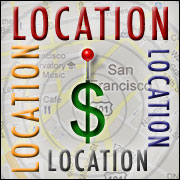
Google might be thinking about invading the hyperlocal news field.
It is testing a local news card in its Google Now service, Quartz reported. The beta service dishes up location-based information to owners of mobile devices, and it could possibly work well with Google Glass.
“I love the idea that when we eventually all have our Google Glasses, [our] award-winning journalism, events calendar and wiki will be popping up in front of eyeballs throughout town,” Brian Wheeler, executive director of hyperlocal publisher Charlottesville Tomorrow, told TechNewsWorld.
Google did not respond to our request to comment for this story.
Do Hyperlocal News Sites Work?
Online local news sites have not done very well since the hyperlocal news frenzy began back in 2009. NBC shut down EveryBlock in February, The Daily Voice filed for Chapter 11 bankruptcy in May, and AOL’s Patch has been hemorrhaging money and staff.
However, “The local news industry is strong, healthy and growing,” Dylan Smith, chairman of Local Independent Online News Publishers, told TechNewsWorld.
Patch and other networked plays are “not local” because “they seek to profit from communities rather than being invested in them,” Smith continued. Giant chains “trying to templatize the production of news” does not work.
“The premise of getting news about your community is that your community is special and unique,” remarked Ben Ilfeld, founder of the Sacramento Press. “You are associating your personal identity with a local tribe. This is something corporate plays always mess up.”
Going Local, Thinking Global
It could be argued that Google’s position as an Internet search powerhouse, and its strengthening geo-location capabilities, would positively impact its move into hyperlocal news if that should come about.
Google recently added live incident reports on road closures and on-the-go rerouting to Google Maps, for example. Google News already uses geo-location to provide readers with relevant local news, and the GPS is turned on by default when mobile device users go to Google Maps.
However, Google is facing a complaint in the EU from FairSearch, a coalition consisting of 17 global businesses including Microsoft, Oracle, Nokia and TripAdvisor over its mobile strategy.
If this evolves into an investigation, it might put a crimp in Google’s plans for hyperlocal news.
We Love the Big G
Local independent online publishers appear to be enthusiastic about Google’s possible entry into their field.
“Google’s exploration of new push technology for local news … sounds like a great concept,” Lion’s Smith said. “Google executives have long been responsive to the concerns of local news publishers, and we’re confident that good working relationship will continue as independent publishers become an even larger force within the news industry.”
Google “will be looking for content, and we have that in spades, and it’s all geo-tagged,” Charlottesville Tomorrow’s Wheeler observed.
Hyperlocal publishers “know their communities and how to produce quality civic media,” he continued. “That can’t be replicated by Google without investing in boots on the ground for a long period of time, and that’s probably not a scalable enterprise for them.”
Still, it’s not clear whether Google’s venture into hyperlocal journalism will succeed. Staff at some of the sites that have failed have complained that local businesses have small-to-no budgets for ads, and local sites don’t attract enough eyeballs.
Further, geo-location may not be the most efficient targeting mechanism for news, the Sacramento Press’s Ilfeld told TechNewsWorld.
“Doing new media using old media benchmarks is a recipe for failure,” Ilfeld explained. “Hyperlocal is about identity and engagement. It’s expensive to do it right, and scaling has not proved to be the answer thus far.”



















































